The fast modernising world has left little space for individualism. Cold calls, mass outreach programs, and corporate megalomania dominate social interactions in our contemporary times, creating for us a superficial world far resigned from reality. ‘Sorry To Bother You’ tries to throw light on that and probes into modern-day consumerism through the lens of race relations and class divide. Directed by debutant Boots Riley, the eccentric augur-like prophetization revolves around the journey of Cassius Green from rags to riches and the simultaneous changes in his personal life. Laced with clever writing and some of the best dark humor presented on-screen in recent years, ‘Sorry To Bother You’ blends fundamental axioms of labor economics with politically charged motivations to realize its ambition of creating a juxtaposed universe that familiarizes the audience with its competing misconceptions about the world.
While the film clearly tags social justice in its curriculum, it doesn’t center around that. Riley attempts to gauge the attention of the viewer towards a larger, universal issue of labor exploitation. The ironically named WorryFree in the film is a representative of innumerable organizations working around the world that practice something called corporate slavery. Countless white and blue collar jobs are undercut in wages and overburdened with work until late hours. The falling global economy compels contraction to such jobs and effectively ensures the concentration of wealth in the hands of few. The idea, quite frighteningly, stems from the current situation in the States, where more than half the country’s wealth is held by one percent of the population. The issue of wage inequality invariably births racial disparity, which Riley explores through the refreshingly original metaphor of the ‘White Voice’.
Riley’s background as a social activist heavily influences the underlying tones of political wanderlust in the narrative. Its physical manifestation is a spectrum of well-developed characters, who fit seamlessly in the scheme of things. His perception of contemporary free-market and labor economics drive an emotive story that is universally relatable and accessible.
Plot Summary
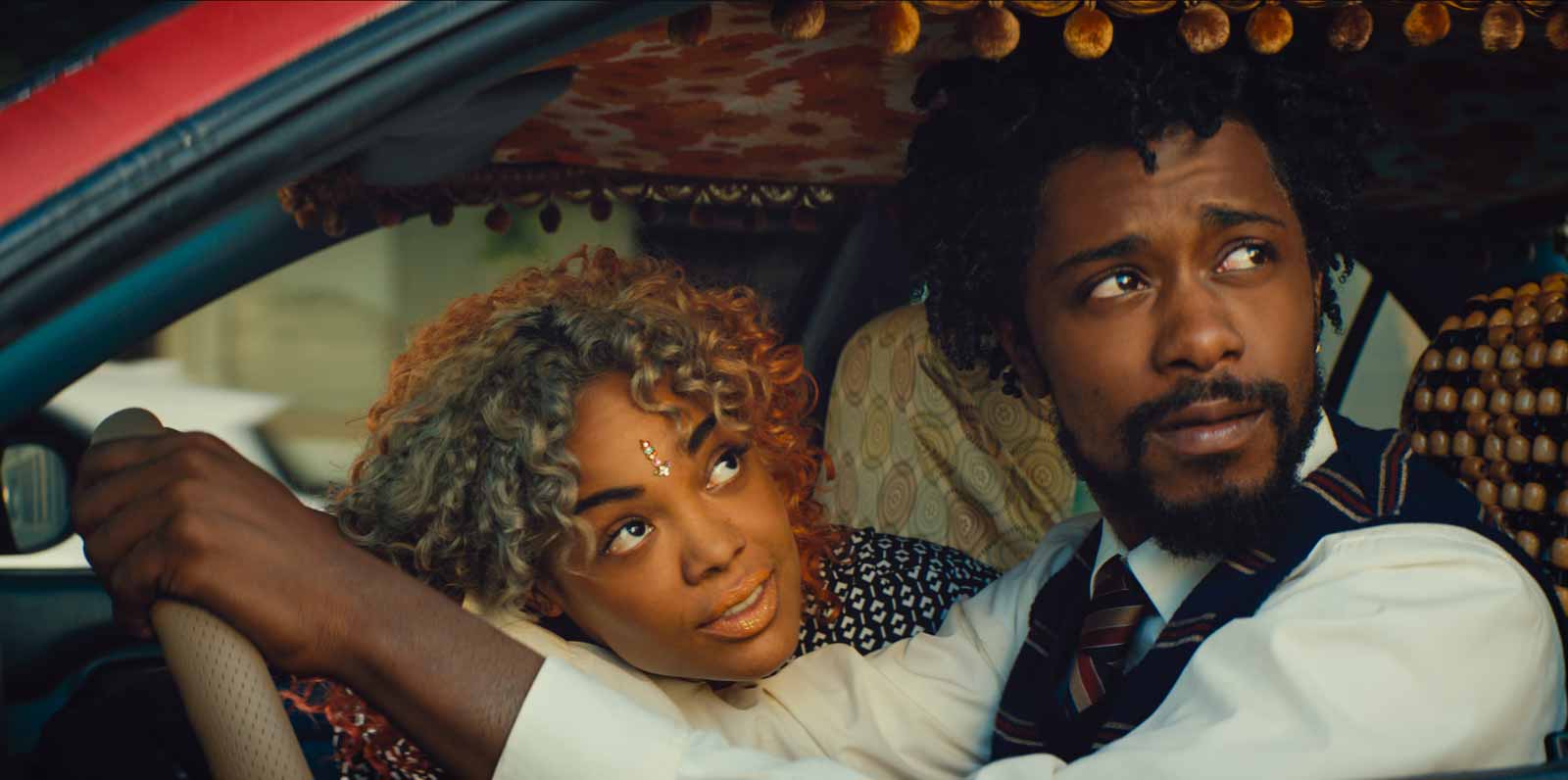
The plot of the film revolves around the life of Cassius Greene, an unemployed man desperately in need of a job. He gets one at a local telemarketing firm, RegalView, despite lying on his resume and about his qualifications. The claims so made land him the job, proving how trivial its nature is. Cash’s girlfriend, Detroit, is a free-thinking woman and is secretly a part of a radical organization called ‘The Left Eye’, which is birthed as a revolt against the illegal and inhumane practices of WorryFree. When Cash starts work, he underperforms due to the customers not ‘trusting’ him. When a veteran offers kind advice to change his voice to the ‘White Voice’, Cash tastes instant success and connects with the people he calls thereon. The newfound popularity doesn’t go unnoticed as his boss informs him of a promotion to the pious upper floor, where salesmen are known as the Power Callers.
Squeeze, a fellow employee, concocts a plan to unionize and protest against RegalView’s unethical and unproportionate work-pay schemes. Cash and Detroit become a part of the protest, with the former expecting to be fired, but instead is pleasantly surprised when he gets a promotion to the upper floor. To his amazement, Detroit’s conspiracy theories about the selling of human labor by WorryFree turns out to be true. The ‘Power Callers’ internationally sold arms and labor to potential and willing buyers. Even though the practice is unethical and illegal, the pay is enormous, which convinces Cash to continue without saying anything. He uses the money to buy a new house and a boisterous life with his girlfriend, who finally confronts him about his job. The relationship between the two gradually deteriorates. In the midst of this all, Cash is invited to an exclusive party by owner and CEO of WorryFree, Steve Life, to his house. When at the party, Cash accidentally stumbles upon a mystical and unreal horse-man mutant, which he believes to be a hallucination induced by his drug intake on the night. When he confronts Lift about the same, he bears witness to a program in works by WorryFree which plans to create a serum which will convert humans into half horses to boost their work productivity.
After this revelation, Cash runs to Detroit, who tells him about the video message he sent her last night. With his fears now confirmed, Cash takes the secret to the public on a reality show called I Got the Shit Kicked Out of Me!. His divulged secrets further boost Lift’s status in the media as a scientific pioneer. WorryFree’s stocks sky-rocket and the plan backfires. Cash joins hands with the protestors and proceeds to bring the office down. As we come to the end of the movie, Cash suddenly transforms into one of the equisapiens, affirming the drug that Lift gave to him as the serum as opposed to cocaine. With some other victims, Cash can be seen breaking into Lift’s mansion and muttering the words “sorry to bother you” as the screen turns black.
The White Voice
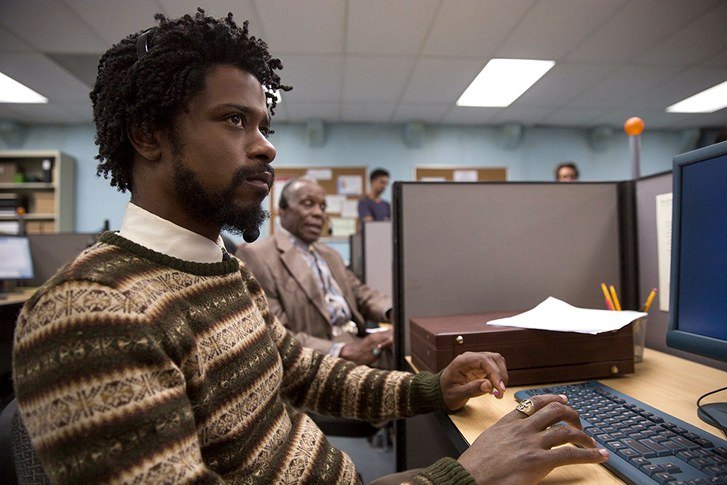
The brightest, most fashionable thing to take away from Riley’s enigmatic dream-like, high octane sci-fi, was the ‘White Voice’. As far as I could conclude, the voice is a tool Riley uses to convey the sense of distrust that people have of the Afro-American community, and in general, anyone who is not white. The pay disparity between whites and non-whites is statistically proven and confirmed by various researches carried out. This divide multiplies with every stage in an individual’s life, resulting in class differentiation and a wide gap between the rich and the poor.
“Let me give you a tip. If you want to make some money here, use your white voice”.
Taking inspiration from Richard Pryor’s brevity and stand-ups about race relations in modern America, Riley uses the common axiom of ‘not what, but who’, concerning sales, to bring out the insecure and prejudiced mindset of the common population. Much like ‘The Wolf of Wall Street’, the goods being sold become irrelevant and the seller who makes the sale assumes the forefront. “Become their friend,” quipped Dicaprio as Belfort in TWWS, “earn their trust, and they’ll buy stuff from you”. Another similar effort was made in Spike Lee’s formidable return to the screen, ‘BlacKkKlansman’, which revolves around a black police officer, who infiltrates the KKK as white man undercover. Even though Lee and Riley set their timelines decades apart, the common thread of the use of the white voice as a seductive fiction stands out. When Cash meets Langston, the wizened old warhorse, he says: “It’s what they wish they sounded like, what they’re supposed to sound like”. Riley’s veiled critique of the social mores regarding race in modern America and how they could possibly get worse as time passes by is frightening and portrayed with great honesty.
The Left Eye
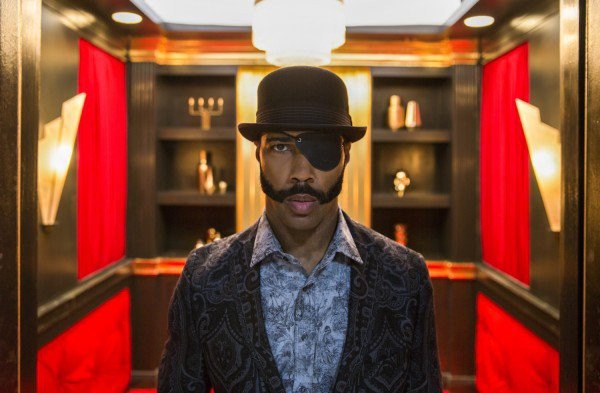
Riley’s careful and detailed understanding of the current political and social ideologies added considerable depth to the screenplay. The Left Eye, a radical organization that resists corporate dominance, is not far removed from reality, with similar organizations working day and night to check labor exploitation. The concept of the Left Eye refers to many liberal-minded, i.e. left, efforts working toward championing the cause of human rights. The film uses the Eye, I believe from Atwood’s dystopian ‘The Handmaid Tale’, to keep watch and constantly tries to draw the attention of those in power to realize WorryFree’s intentions. Their illegal operations are often brought out to the public eye through the use of graffitis, which requires the vilification of WorryFree posters and endowments. In the current socio-political climate, the left is constantly at loggerheads with the governments around the world, endorsing their belief in basic human rights for all.
The Golden Elevator
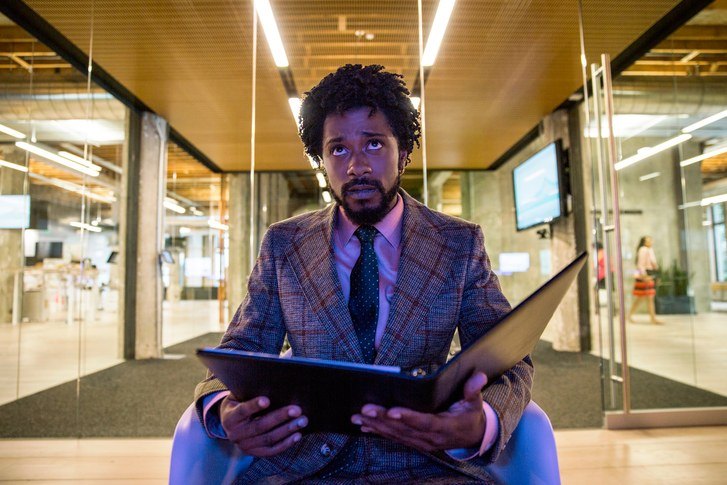
One of Cash’s dream after joining RegalView is to be promoted to the upper floor and use the golden elevator. He often spots fashionably dressed callers using the elevator for their exclusive purposes. Not only does he envy the people who use the elevator, but also yearns to be a part of that elite club. The Golden Elevator represents Cash’s ambition and his desire to migrate to the top one percent who makes the real money. Both Cash and the Golden Elevator, I feel, are universal archetypes for the general population and their dreams to get rich; and rich quickly. The tedious and proprietary process to operate the lift somewhat demonizes the capitalist greed and urge of the powerful to remain so. Riley cleverly inserts the scene where Cash uses it for the first time. Through a series of complex codes, akin to his own efforts to get there, the lift finally excites to life. I think this brilliant depiction of power-dynamics in the corporate world becomes another subject of applause and praise for Riley and the dramatization of a huge social issue with a minute-long scene.
Detroit
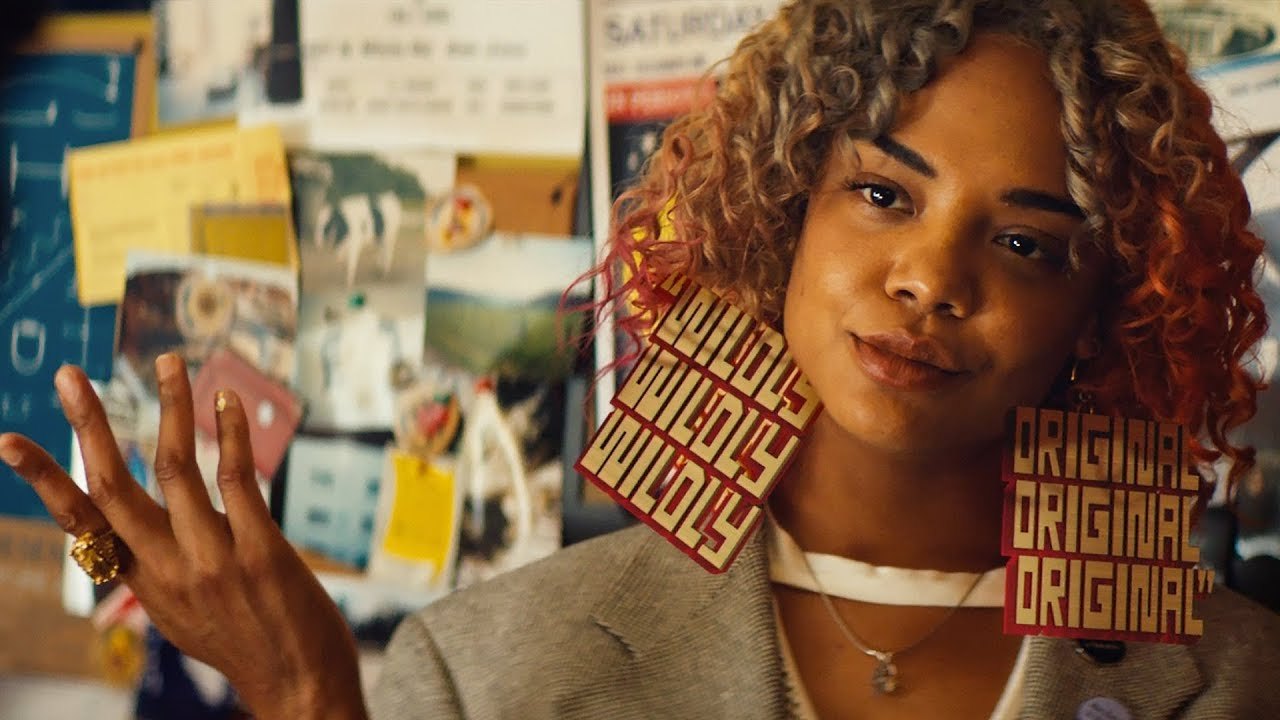
If you still doubt Riley’s sense of humor, just look at the earrings. Although the character of Detroit might seem insignificant in the larger narrative of the film, its symbolism is a concrete effort to bring out radical Black iconography. While the character itself has been subject to criticisms for being subverted and mismanaged, the underlying political importance is undeniable and found a voice with many commentators. Riley describes her as “a dreamy girl whose entire purpose in the film is to get the lead to open up and explore the world and all its magical possibilities as if she were a small, whimsical child”. In all honesty, Detroit seems more and ideogram of black resistance and history of racial inequality than a person with a beating heart. Right from her aesthetic dresses, to her manic art, Detroit embodies several notions of rebellion, some of which form the relevant thematic exposition of the film. The lyrical experiment largely pays off, successfully standing as an unperturbed vessel of truth and voice of the few.
Detroit, thus, is a symbol of feminism, avant-garde art, independent thinking, and an interpretive tool for members of all communities fighting for a cause to expedite and revolutionize their struggles. She’s a criticism of capitalism and other forms of extreme subversion of basic human instincts that have become a stubborn and ubiquitous reality of the time.
The Ending
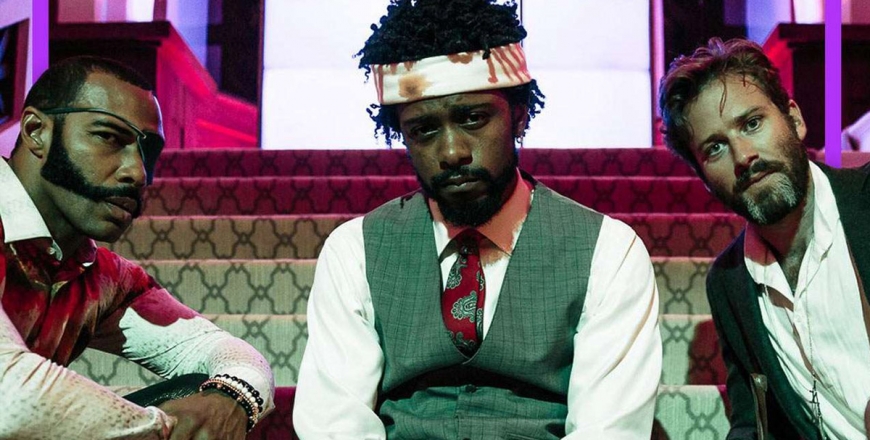
The climax leaves our troubled protagonist as near happiness as one can be and subsequently as withdrawn from the notion as possible. Within a matter of seconds, Riley’s gumption-filled lead man transforms from a normal human being living his dream life, to his worst nightmare. This sudden extraction of Cassius from normalcy to surrealism and a hallucination-like reality was an unexpected twist and indeed is one of the most absurd endings ever recorded on screen. The mind is instantly drawn to Cash’s moments of privacy with Steve Lift in his mansion, where he snorts a white powder -apparently cocaine- and then discovers the horse creatures. His suspicions of the powder being the serum that Lift then explains to him, turn out to be true in the end. There seem to be no other plausible explanations for his metamorphosis, if you will.
Cash eventually proceeds to exact revenge on Lift at his mansion with other similar disabled persons. Uttering the ironic “sorry to bother you” that he kickstarted his cold calls with, Cash tears into Lift, which, though visually remained out of the viewer’s periphery, is heard in Lift’s cries of agony and possible regret. The anti-climactic ending leaves the viewer with mixed feelings, especially how we see Cash realizing his mistake and choosing to speak against the unethical practices of WorryFree. He is an emblem of the tragic hero, popularized by classic Greek gospel tales and modern Gothic literature. He finds himself in a situation similar to Antigone, Medea, and Hamlet, all of whom erred in judgment and thus suffered the consequence of their actions. His quandary whether to reveal the secrets of the company and thus follow his moral compass, or become a part of the exploiters and wither the last piece of humanity left within him, presents a deliciously charged challenge for the viewer. While we might never know of the real reason behind Cash’s transformation, we can form a universal consensus that the ending was unique, and in a way, was fitting in the schematic blueprints of the film.
Final Word
On the whole, ‘Sorry To Bother You’ represents an enticing blend of dark, brutish comedy and quiet, modernized apocalyptic storytelling, in the process achieving a rare feat of technical brilliance and cinematic realism. It greatly benefits from its mesmerizing lead performances and Riley’s dedication and honesty to the story he aspires to tell. All things considered, ‘Sorry To Bother You’ sets a new precedent in indie filmmaking, one that is now vulnerable to the test of time.
Read More in Explainers: First Reformed | Get Out | Black Panther

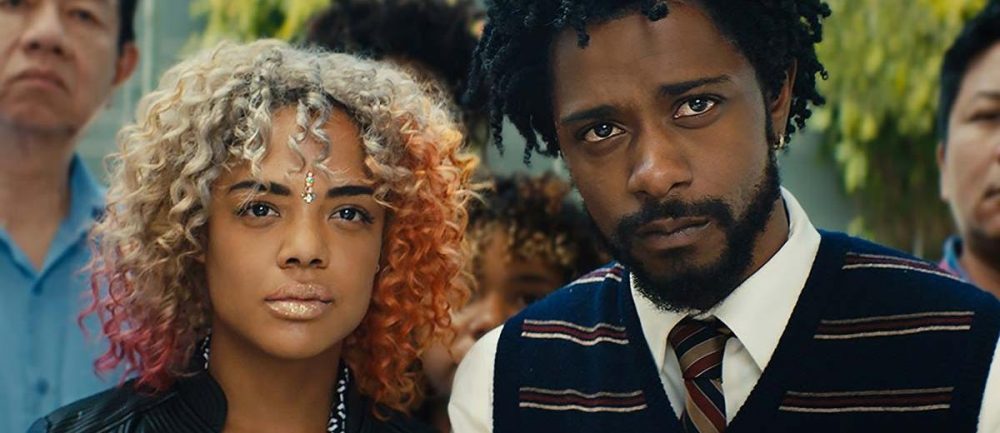
You must be logged in to post a comment.